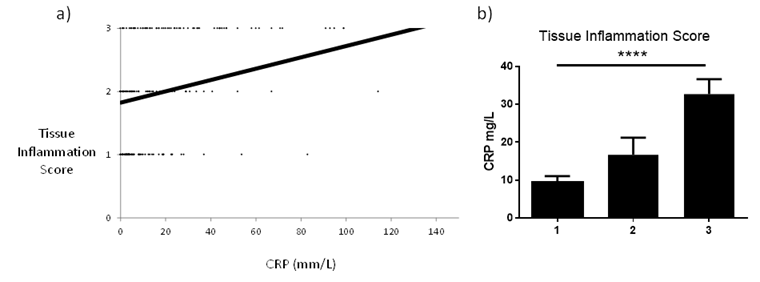Session Information
Date: Tuesday, November 7, 2017
Title: Rheumatoid Arthritis – Clinical Aspects V: Predicting Treatment Response
Session Type: ACR Concurrent Abstract Session
Session Time: 4:30PM-6:00PM
Background/Purpose:
Despite the clinical role of synovial histology in the differential diagnosis of arthritis, there are still profound unmet needs regarding predictors for diagnosis, disease progression and response to treatment. Nevertheless, histological examination of the synovium allows for the most robust appraisal of levels of local synovial inflammation.
The most common validated disease activity score is the DAS28, incorporating either CRP or ESR. As CRP is now widely accessible, and is responsive in a more timely manner to changes in systemic inflammatory activity, the DAS28—CRP is widely used today.
It is noteworthy that RA registry data for over 9000 patients has shown that more than half did not have elevation of ESR or CRP, but had ongoing disease activity as determined by joint counts and global assessments (1).
Methods:
223 consecutive subjects with RA with knee arthralgia underwent arthroscopy. Serum samples were taken and serum CRP levels measured, immediately before the procedure. A macroscopic score of synovitis on a visual analogue scale ranging from 0-100mm was recorded by the operator at arthroscopy. Based on the Haematoxylin and Eosin staining, a tissue inflammatory score for each biopsy was applied by a hospital pathologist with extensive experience examining synovial biopsies (1=normal synovium, 2=mildly inflamed and 3=moderately to severely inflamed).
Results:
A statistically significant positive correlation was observed between the CRP as well as the DAS28-CRP, and the level of inflammation in the biopsy retrieved (n=197, rho=0.42, CI 0.30 to 0.53, p<0.0001; n=189, rho=0.23, CI 0.09 to 0.36, p=0.0011 respectively) and these results are depicted in figure 1 a and b.
Figure 1
Tissue inflammation scores were available for 75 subjects with a normal CRP (<5mg/l). 49.3% of patients had histological evidence of inflammation in their synovium, despite having normal serum CRP levels, and 10.6% had moderate to severe synovitis as assessed at arthroscopy. Tissue inflammation scores were available for 14 subjects defined as being in clinical remission by DAS28-CRP criteria (<2.6), and 71.4% of these subjects had histological evidence of inflammation in their synovium. Despite being classified as being in remission by these criteria, 21.4% had moderate to severe synovitis at arthroscopy.
Conclusion:
Better biomarkers are required in RA to accurately appraise CRP. It is conceivable that there are a subset of RA patients where disease cannot be normally monitored by CRP; more work is needed to determine if such patients can be identified at the outset.
References:
1. Kay, J. et al (2014). Arthritis Res Ther, 16(1), R40.
To cite this abstract in AMA style:
Orr C, Najm A, Young F, McGarry T, Biniecka M, Fearon U, Veale DJ. The Utility and Limitations of Serum C-Reactive Protein in Appraising Synovial Inflammation [abstract]. Arthritis Rheumatol. 2017; 69 (suppl 10). https://acrabstracts.org/abstract/the-utility-and-limitations-of-serum-c-reactive-protein-in-appraising-synovial-inflammation/. Accessed .« Back to 2017 ACR/ARHP Annual Meeting
ACR Meeting Abstracts - https://acrabstracts.org/abstract/the-utility-and-limitations-of-serum-c-reactive-protein-in-appraising-synovial-inflammation/

